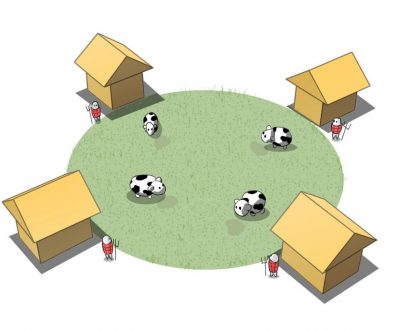Government involvement in garbage collection is disastrous for the environment

Whenever a service is rendered with a universal flat fee for unlimited use, over-consumption runs rampant. (Consider the lack of self-control at an all-you-can-eat buffet, or the overuse of air-conditioning in a hotel room.) In the case of municipal garbage pickup, households are generally charged a flat rate as part of property tax, and the waste placed by the curb is whisked away, generally regardless of the amount. With no real choice on how refuse is handled, taxpayers have zero financial incentive to reduce the quantity of waste they generate.
According to the Environment Protection Agency’s 2013 figures, the average American generates 4.4 pounds of trash every day, much of which is paper and packaging. Imagine for a moment that this large amount of waste came at a direct daily cost to consumers. The cost of generating waste would financially incentivize people to find ways to reduce their garbage levels. Manufacturers would face pressure to reduce product packaging wherever possible, and more items would be re-purposed or repaired rather than replaced. Additionally, recyclable items would see a substantial boost in proper disposal, as it would no longer be penalty-free to throw products like aluminum cans and newspapers in with the regular garbage.
The current model of municipal waste removal fosters consumer apathy, since the consumer has only one option for waste management, and essentially no say in how the service is handled. Any sense of responsibility an individual would normally have for generating waste is eclipsed by an “out of sight, out of mind” mentality. In a free market, households would naturally be charged according to usage, putting downward pressure on their waste generation levels. On the provider side, waste removal companies would face pressure to utilize eco-friendly practices and other qualities desired by consumers. In a monopolistic system, no such pressures exist.
Removing government from waste management would place the responsibility back where it belongs in the first place: with the individual. Financial savings motivate us in most other aspects of economic life; why should trash be any different?


October 17, 2018 @ 2:38 am
The 4.4 lbs/day/person figure is disturbing.
This topic is an interesting thought. It makes sense that an unlimited service would produce excess waste if there was a low fixed cost. The alternatives to the fixed cost are interesting to ponder as well.
I have also seen when individual would take a trailer full of garbage to the dump, they are usually charged by the pound, or load, or other methods. I have seen first hand how this effected the decision of what was taken to the landfill. It also determined what got incinerated on site.
October 17, 2018 @ 2:48 am
Also, in a market sans government monopoly, the facility to which the individual takes the garbage would have a high incentive to recycle what could be recycled (for example steel can be salvaged and resold), which would be manifested in positive price pressure on the customer to properly separate garbage and limit types which would be particularly hazardous or for any other reason more costly to dispose of). End result: more frugal consumption, less waste, more recycled materials.
October 19, 2018 @ 10:49 am
One fear is that if consumers were charged on a per pound or by piece basis they may be reluctant to pay for collection and instead decide to dump their trash in abandoned or unmonitored areas. When I was younger, vacant land was basically dumping grounds four many members of neighborhood. When regular waste collection started and especially pick up for larger household items, dumping appeared to have decreased dramatically especially in rural areas. This isn’t necessarily an argument for it to be publicly contracted and implemented but I believe a model could be developed to deter people from just dumping their trash anywhere as well as making it an opt in service.
October 19, 2018 @ 11:04 am
That is an excellent concern.
One model to look to for a solution is the concept of private property. Currently, we have a situation like the Tragedy of the Commons, in which areas “owned by no one” are not cared for well. Contrast the amount of litter per acre in a public park to the amount of litter per acre of private land, and the private land will generally be far cleaner. According to Florida law, an individual can dump 25 cubic of garbage on public land and not face any penalty.
An individual disposing of waste on someone else’s property is in direct violation of property rights, and should be held accountable to the property owner in the same way that any other private property violation or destruction would warrant.
December 31, 2018 @ 9:49 am
Some places have monetized waste disposal. A few states have “pay as you throw” systems where you must take your garbage to the dump and pay for each bag you leave. Taipei City began a system where garbage had to be put in pre-paid bags and carried out to garbage trucks as they passed (bags cannot be left out per their “no trash touches the ground” policy), and everything is separated by type (recyclables, non-recyclables, raw food for compost, cooked food for livestock feed). Now they are testing out automated stations where garbage is placed in compressors and users are charged by the weight of their refuse. People are paid a small amount for recycling. There are few public trashcans so people are responsible for carrying around their refuse until they get home.
What stops people from illegal dumping? Taipei charges fines up to $200 for illegal disposal of garbage and when someone is caught, video footage of the crime is posted publicly. Maybe it would take this system of carrots and sticks a few years to instill good waste-management habits, then less oversight would be needed in the future. But once video monitoring is in place, and the government is making money from fines, how likely are they to back off? What are we willing to cede in order to have cleaner streets and a healthier environment?